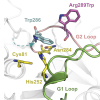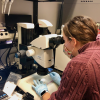We are using next-generation DNA-sequencing technologies to analyze whole genomes, in addition to the more traditional whole exome approach, in order to identify the underlying genetic cause to disease. The information gained from these high throughput techniques allows us to better diagnose patients as well as more accurately develop animal models.
In population genetic studies, we also genomics technologies to identify risk factors for eye diseases. We are mapping genes for uveitis, macular dystrophies, and retinal degenerations. Other projects include understanding gene expression patterns during retinal development, corneal inflammation, squamous cell carcinoma, and in specialized eye tissues such as the retinal pigment epithelium and ciliary body.






